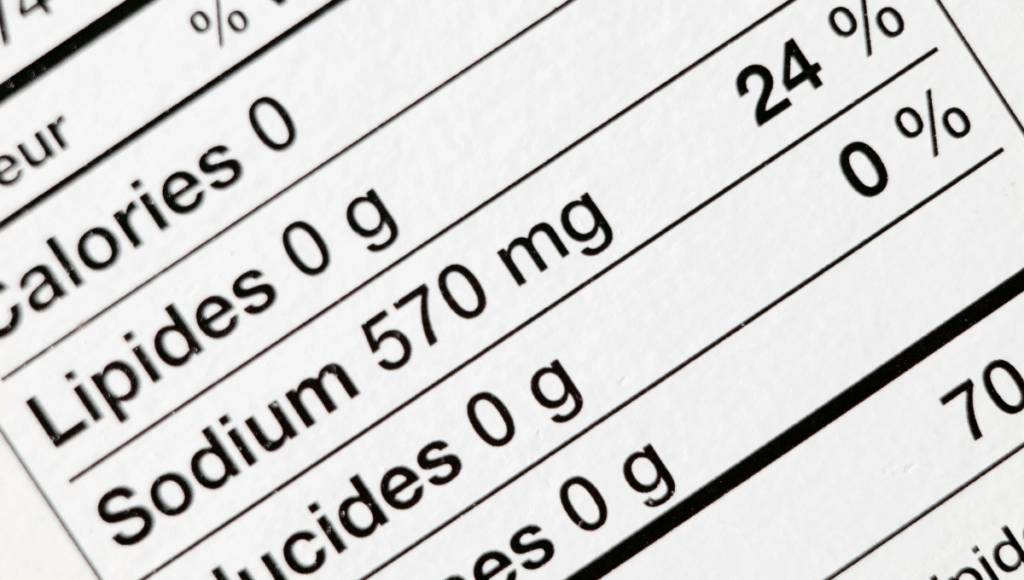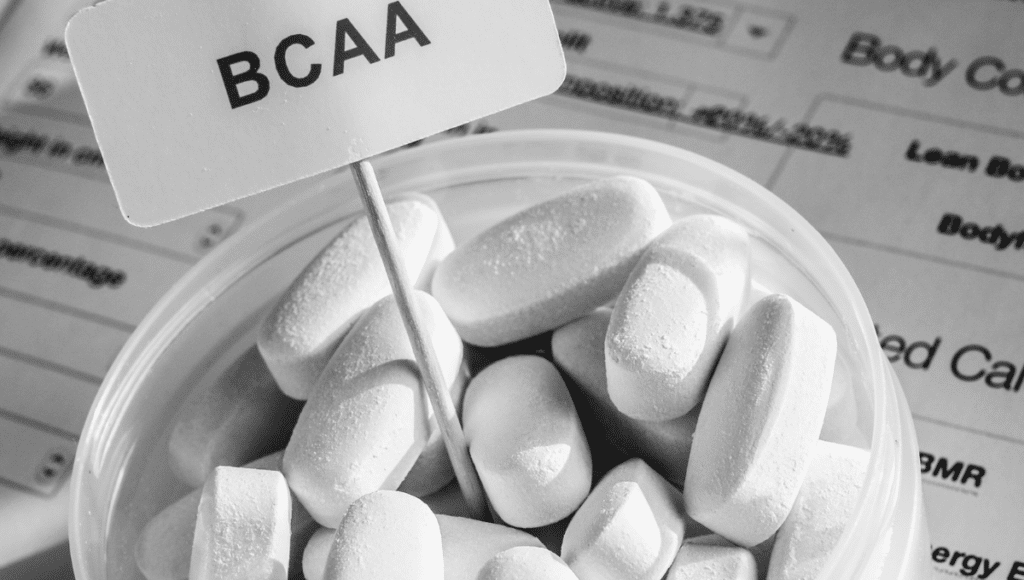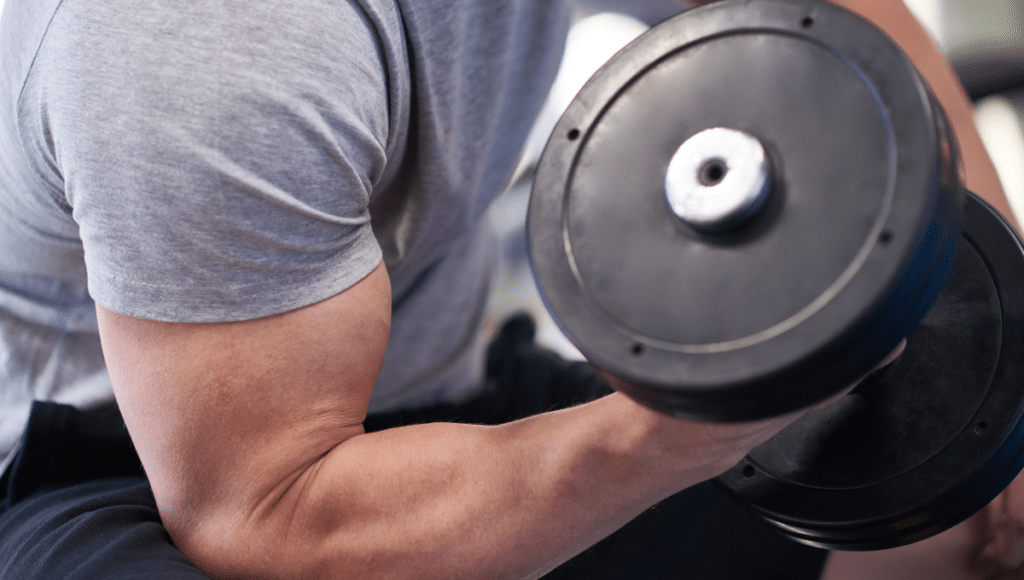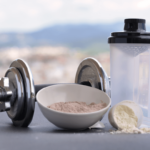You’ve seen the jars of whey protein and BCAAs in the vitamin aisle, but do you really need these supplements to maximize your workouts? Is one option better than the other? Do these popular supplements work?
Don’t panic just yet. The whey protein vs. BCAAs debate isn’t over, and we cover everything you need to know to get the most out of your training sessions.
Jump to:
Understanding Whey Protein
Whey protein is a popular milk protein supplement widely used by athletes, bodybuilders, and fitness enthusiasts. It’s a high-quality protein derived from milk and is available in protein powders, bars, and shakes.
Whey protein powder is a complete protein with the building blocks your body needs to build muscle.
This means the supplement has all the essential amino acids the body needs to function correctly. Whey protein supplements are easily digested and absorbed, making them a no-brainer for post-training recovery.
It has also been shown to help in building muscle and muscle breakdown. It may also reduce muscle soreness and improve strength and endurance.
Benefits of Whey Protein
Whey protein shakes, powders, and bars can provide several advantages in and outside the gym. Here are a few benefits of supplementing with whey protein:
- Stimulates muscle protein synthesis: Whey protein contains high levels of BCAAs, which are crucial for developing and repairing muscles. Consuming whey concentrate after a training session lets your body quickly absorb the BCAAs. This allows the amino acids to promptly repair damage and stimulate muscle gain.
- Mitigates muscle soreness and enhances recovery: Whey protein may help reduce muscle soreness and provide faster recovery time, allowing you to hit the gym sooner. The product contains bioactive peptides with anti-inflammatory properties. These compounds help to reduce damage caused by intense exercise.
- Contains all essential amino acids: Whey is a complete protein, meaning it contains all 20 essential amino acids the body needs. These amino acids are crucial for several functions inside and outside building muscle.
- May help lower blood pressure: Research has shown that whey protein may benefit cardiovascular health. For instance, one study found whey protein supplementation was linked with a small but significant reduction in blood pressure.
- Can aid in weight loss: Whey protein concentrate is very filling, which can help reduce sensations of hunger and help you feel full for longer. This can help individuals with their weight loss goals.
Despite all the benefits, it’s crucial to note that this dietary supplement is not suitable for all individuals. People with milk allergies or lactose intolerance should avoid these products, as they can experience digestive complications.
Additionally, some individuals report bloating, cramps, or other gastrointestinal distress when consuming whey protein.
Recommended Dosage and Timing
The recommended dosage and timing of whey varies depending on the individual’s goals, body weight, activity level, and overall diet. Your daily intake will vary, and it’s essential to consult your healthcare provider beforehand. That said, here are a few general guidelines to keep in mind:

Dosage
Although daily protein intake varies depending on the individual, the recommended dietary supplement dosage is roughly 20-30 grams of whey protein. That said, some athletes and bodybuilders consume more than 50 grams.
Timing
Consuming whey within 30 minutes to 1 hour is typically recommended after completing a training session.
Muscle protein synthesis is particularly receptive during this time, which can help in recovery and muscle development. Ingesting whey before a during a training session may also offer benefits, like increasing endurance and reducing muscle damage.
Furthermore, using the supplement as a snack or meal replacement can be beneficial. Whey protein shakes can be particularly helpful if you’re trying to increase your overall protein intake.
Understanding BCAAs
BCAA’s (branched-chain amino acids) are composed of three essential amino acids: leucine, isoleucine, and valine. The human body cannot produce these amino acids, and they must be obtained through diet or dietary supplements.
Branched-chain amino acids are found naturally in protein-rich foods like meat, dairy, and legumes. However, many fitness enthusiasts use branched-chain amino acid supplementation to improve their physical performance and promote muscle growth.
The amino acid leucine is known to stimulate muscle protein synthesis. Isoleucine and valine may improve endurance during workouts and reduce muscle fatigue.
Branched-chain amino acid supplements come in several forms, including powder, capsules, and drinks. They can be taken before, during, or after endurance training.
Benefits of BCAAs
There are several benefits to using BCAA supplements, and athletes, bodybuilders, and fitness enthusiasts commonly utilize them. Some of the main effects of BCAAs include the following:
- Promote Muscle Growth: BCAAs can help stimulate muscle protein synthesis, the process by which muscles repair and grow after training. Specifically, leucine is considered the most critical BCAA for muscle growth, and many products contain more quantities of it.
- Reduce Muscle Soreness: BCAAs have been proven to reduce muscle soreness, improving recovery after endurance training.
- Reduce Muscle Loss: These supplements may help preserve muscle mass during weight loss or calorie restriction periods.
- Improve Athletic Performance: Isoleucine and valine may enhance endurance and reduce muscle fatigue, which can help you train for more extended periods.
- Support Immune System Function: Branched-chain amino acids have also been shown to bolster immune system function, reducing the risks of infections and sickness.
Although branched-chain amino acid supplementation can have several advantages, it should not be relied on as a primary source of nutrition. BCAAs from food are paramount for overall health and muscle development.
Furthermore, always be mindful of the quality and purity of a supplement. Consult your primary physician before starting a new supplement regimen, as you might experience unwanted side effects.
Recommended Dosage
Usually, a typical dosage of branched-chain amino acids offers 5 grams of BCAAs.
BCAAs include leucine, isoleucine, and valine, usually in a 2:1:1 ratio. It’s best to get around three grams of leucine per serving, as it’s needed to stimulate muscle protein synthesis.
A six-gram serving of the supplement should include 3 grams of leucine and roughly 1.5 grams of the other essential amino acids. The highest ratio you may want is a 3:1:1 ratio, especially after high-intensity training.

Additional BCAA dosages may not be effective, and it’s best to consult your primary healthcare provider before making any adjustments to your workout supplement regimen.
Recommended Timing
The recommended timing of branched-chain amino acid supplementation varies, depending on who you ask.
Although more research needs to be conducted, consuming BCAAs before training can fuel your muscles and preserve muscle glycogen stores. This may help reduce fatigue during training, allowing you to work out for more extended periods.
Consuming branched-chain amino acids during or after training may help improve muscle recovery and growth.
Whey Protein + BCAAs: Is It Necessary?
So, the question remains, is it necessary to take both whey and branched-chain amino acid supplements?
The short answer is: no. BCAAs aren’t entirely necessary, especially if you’re consuming adequate protein from high-quality sources. Whey protein is a complete source of protein, meaning it contains leucine, isoleucine, and valine.
In some cases, you may want to add a bit more leucine if your whey product doesn’t contain the correct ratio. But overall, it isn’t necessary to take both supplements. That said, there are some instances where you may want to choose one product over the other.
When to Choose Whey Protein
So, if you don’t necessarily need to take both supplements, when should you choose whey protein over BCAAs?
You Want to Increase Your Daily Protein Intake
Protein is an essential nutrient that plays a critical role in building and repairing muscle tissue. The recommended daily protein intake to build lean muscle mass is roughly 0.5–0.8 grams per pound of body weight.
Whey protein is a fantastic option to increase your daily protein intake. The amount per serving varies from product to product, but most options contain 20-30 grams of protein per serving.
Whey is easily digestible, allowing your body to absorb it quickly and reap the benefits. Versatile options, like adding it to shakes, yogurt, or protein bars, make it an even more effective solution.
You Want a Complete Source of Protein
Protein is made up of amino acids, which are often called the building blocks of protein. There are 20 different amino acids, and nine of them are considered “essential.” This is because the body cannot produce them on its own, and they must be obtained elsewhere.
Whey protein is a complete protein source, meaning it contains all nine of the essential amino acids your body needs to work correctly.
Because it’s a complete protein source, it’s a no-brainer for individuals seeking the most bang for their buck. It can help support muscle growth and repair, improve immune function, and bolster overall health.
Furthermore, whey is also highly bioavailable. It’s easily and quickly absorbed by the body, allowing it to be quickly repurposed for various tasks. This makes it a fantastic option for athletes, bodybuilders, and fitness enthusiasts.
You Want to Build Muscle Mass
If your goal is to develop muscle mass, whey protein should be on your weekly grocery shopping list.

Whey protein contains high levels of BCAAs, which play a critical role in muscle growth and repair. The BCAAs found in whey protein are especially important for muscle growth because they stimulate muscle protein synthesis, which is the process by which the body builds new muscle tissue.
With 20–30 grams of whey protein per serving, you can quickly get the protein and nutrients you need to hit your fitness goals.
That said, whey protein is not a magic solution or meal replacement. It is still essential to consume a balanced diet with a variety of common protein sources, like lean meats, fish, eggs, dairy products, beans, and nuts.
When to Choose BCAAs
If whey protein has everything you need, why would you ever need to consume branched-chain amino acids? Here are a few cases where BCAAs may be the best option.
You Exercise In a Fasted State
Many lifters prefer to train in a fasted state where they haven’t consumed food for several hours before their workout. Fasted workouts can be beneficial, as they help to enhance fat burning, improve insulin sensitivity, and increase metabolic flexibility.
That said, training in a fasted state can also lead to muscle breakdown, especially during intense or extended sessions.
This is because the body pulls energy from different sources, like glucose, glycogen, and fat. When glucose and glycogen stores are depleted, the body turns to muscle tissue as a source of energy, which can lead to muscle breakdown after exercise.
This is where BCAAs can come in handy.
BCAAs, specifically leucine, can help to prevent muscle breakdown during exercise by providing the body with the amino acids it needs to build and repair muscle tissue. By supplementing with BCAAs before or during exercise, you can help to reduce muscle breakdown and support muscle recovery afterward.
You Want to Reduce Muscle Soreness and Fatigue
Muscle soreness and fatigue are common symptoms after intense exercise, especially during the initial stages of a new exercise program. Muscle soreness and fatigue may limit your ability to train, which can lead to reduced progress toward fitness goals.
Branched-chain amino acids, specifically leucine, can help to reduce these symptoms by promoting muscle protein synthesis and reducing muscle protein breakdown.
Muscle protein synthesis is the process by which the body builds new muscle tissue and is essential for muscle growth and repair. BCAAs provide the body with the essential amino acids to promote muscle protein synthesis. This helps to repair and rebuild muscle tissue after exercise.
By reducing muscle protein breakdown, BCAAs can also help to preserve muscle mass, which can reduce muscle soreness and fatigue.
You Have Diet Restrictions
If you have diet restrictions, it may be wise to turn to BCAA supplements. Diet restrictions, like plant-based or lactose intolerance, can make it challenging to consume high-quality protein sources.
Many plant-based protein sources are incomplete, meaning they do not contain all of the essential amino acids that the body needs to build and repair muscle tissue.

BCAAs include all three of the essential amino acids that are necessary for muscle growth. BCAAs can also be beneficial for people who have difficulty digesting whole protein sources.
Whey protein can be complex for some individuals to digest, causing gastrointestinal discomfort. Branched-chain amino acids are easily absorbed by the body, meaning they can be an ideal option if you have digestive issues or difficulty digesting whole protein sources.
Frequently Asked Questions (FAQ)
Do I Need BCAAs If I Take Whey Protein?
Consuming BCAA supplements isn’t necessary if you consume whey protein. Whey contains all nine essential acids your body needs to function correctly and build muscle mass. That said, BCAAs can be helpful if you train in a fasted state or have diet restrictions.
Which Is Better, BCAA or Whey Protein?
The answer depends on the individual, but whey protein may be better for most lifters. Whey protein contains all the essential acids your body needs and provides additional benefits, like quick absorption and stimulating muscle protein synthesis.















